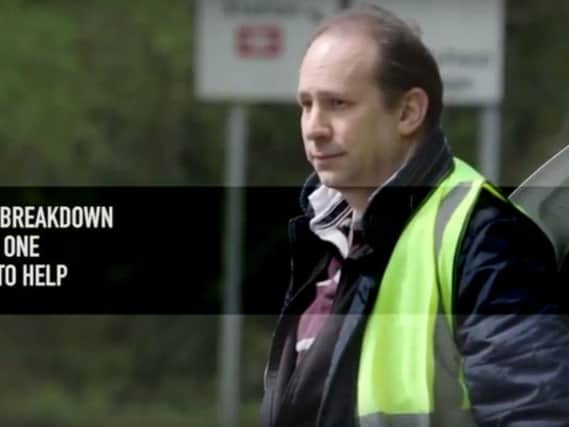RESCUE ME! Chivalry all but dead among British drivers


The slim chances of being rescued will often depend on your gender, the clothes you’re wearing and the area in which you are driving, according to the poll by Nationwide FlexPlus current account1.
With flat tyres, overheating engines and blown gaskets a common feature, the poll of 2,000 motorists reveals 86 per cent of drivers refuse to help a fellow motorist. Conversely, more than eight in ten (84%) said that nobody stopped for them when they last broke down.
Advertisement
Hide AdAdvertisement
Hide AdHowever, the North West are the most obliging drivers with around one in four (24%) who said they would stop and help someone who had broken down.
The research shows the biggest causes of breakdown is a flat battery (23%), engine failure (21%) and a flat tyre (15%). A further six per cent ran out of fuel and one in 20 (5%) reported a snapped clutch cable as the issue. However, one in six (16%) drivers have no cover in place whatsoever, leaving them entirely at the mercy of fellow motorists for help.
And despite nearly three quarters of drivers (73%) suffering breakdowns on busy roads, the research found more than half of motorists (51%) admitted to feeling no guilt when zipping past a stranded driver. And even for those with breakdown cover, nearly a third (30%) of those polled who had broken down in the past would have to rely on other drivers for help due to either having no access to a phone, no phone signal, low or no phone battery at the time. Of those who broke down, one in seven (15%) were stranded in bad weather or on a dark road (9%).
The main reasons for not stopping included people thinking they were unable to offer any help (54%), believing it wasn’t safe to stop (52%), fearing the stranded driver was an unsavoury character (33%), thinking it could be a trap (27%), assuming help was already on the way (22%), or simply driving too fast to stop (20%). However, the research revealed a number of key factors that could be the difference in being rescued or left by the roadside. These include gender, location and appearance:
Advertisement
Hide AdAdvertisement
Hide AdGender split: Women are three times more likely to be rescued from the side of the road, with three quarters (72%) stating they would assist a female driver compared to less than a quarter (23%) who would stop for a man. But when it comes to stopping, men (46%) are twice as likely as women (23%) to assist.
There is also a clear difference between the genders when it comes to the reasons for not stopping. Many more women drive past a fellow motorist on the basis of thinking they couldn’t help. The stats also shows that women appear much more concerned with their safety than men, while men are far more likely to be driving past too fast to stop.
Reason for not stopping – gender difference
Female %/Male %
I didn’t think I could help - 58/48
It wasn’t safe to stop - 51/53
I feel nervous in case they were an unsavoury character - 43/18
It could be a trap - 33/19
I assumed help was already on the way - 22/22
I was driving past too fast - 16/25
Region UK %
North West - 24
London - 18
East Midlands - 17
South West - 15
South East - 14
North East - 13
West Midlands - 13
Scotland - 12
Yorkshire and Humberside - 12
Wales - 8
East Anglia - 8
Northern Ireland - 4
The appearance:
The survey shows that first impressions count when it comes to being rescued, with motorists admitting to be more likely to help a smartly dressed person than someone who is dressed casually or scruffily. And while couples could expect some assistance, groups were the least likely to be offered help.
Advertisement
Hide AdAdvertisement
Hide AdAnd despite a breakdown having the potential to affect any vehicle, drivers with new cars can expect short shrift from passing traffic, with people admitting they would be more likely to stop for someone in an old banger.
Faith was perhaps restored in the good nature of British drivers as the poll revealed just 12 per cent of people would rule out stopping for someone who looked in despair by the roadside.
Least likely to stop for
UK (% who wouldn’t stop)
Someone who looked frustrated or in despair - 12
A smartly dressed person - 13
Someone in a clapped out car - 18
Someone in a new flashy car - 26
A casually/scruffily dressed person - 28
A group of people - 50
Quentin Willson, Motoring Expert, said: “If there is one thing all motorists dread, it’s breaking down.
"In days gone by you might expect a cheerful chap in a Cortina to pull over and help to change your tyre, but according to Nationwide’s FlexPlus research, those days could be a thing of the past.
Advertisement
Hide AdAdvertisement
Hide Ad"If drivers find themselves broken down this bank holiday there are a few simple things they can do to protect themselves, such as moving their vehicle off the road, warning other road users by using their hazard lights and warning triangle, positioning their wheels away from the road, getting out of the car quickly to a safe place and phoning for assistance as soon as possible.”